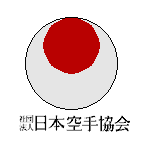| |
The Martial Arts
T. Mikami
All eyes are focused on the two contestants as they face each other in a
sparring match for the "grand championship". Members of the audience
scream "Go White", "Go Red" as each contestant tries to find the best
opportunity for scoring a victory. Suddenly there's a flurry of
techniques - white initiates a kick/punch combination and red quickly
responds with a block and punch. It looks like a "clash" but the judges
rule that white's technique had scored and is declared the Grand
Champion.
Immediately, there are protests from the loser. He questions the
referee's call and in a fit of temper takes of his belt and throws it on
the floor. In the meantime the winner is carried off on the shoulders of
his supporters -, as any hero would be.
Even though the scene depicted above is not necessarily a true account,
it is similar to what frequently occurs in martial arts (Karate, Kendo,
Kung Fu) tournaments.
Displays of ill temper, lack of courtesy and a general obsession with
winning are recent developments that completely misrepresent the marital
arts to the general public.
It cannot be emphasized enough that tournaments and competition are only
one aspect of martial arts training. Even though winning is considered
desirable it is not the ultimate goal and a loss is regarded as a
valuable lesson.
The original purpose of martial arts training was survival. In the
Middle Ages the main function of the Samurai was to fight. His training
involved both a mental and physical preparation for combat. There was a
grave seriousness in training since the stakes always involved life or
death. Alertness, endurance and composure were emphasized.
During peace the Samurai found himself with a completely different job;
that of leadership. It was expected that he be of high moral character,
and that he become a personal example to the general public. Thus the
emphasis in Martial Arts training shifted from survival to personal
development.
Most Dojos (Martial Arts Schools) in Japan have their own code of
conduct which students recite daily. Sincerity, true effort,
determination, respect for others, humility and self-control are
invariably stressed. The same institutions that earlier produced fierce
warriors now produce diligent and conscientious citizens.
The purpose behind the Martial Arts training is to help develop the
practitioner s character to the fullest so that he/she can offer their
best to society.
A true martial artist therefore, is not necessarily the one who wins all
the time but rather the one who is committed to putting forth his best
effort, not just in the execution of his techniques but in every aspect
of his life.
|
|



